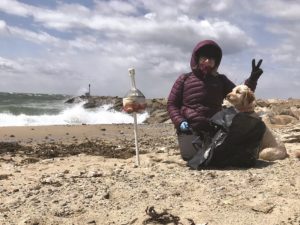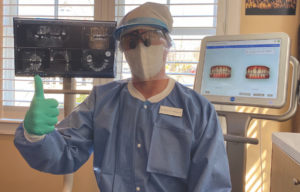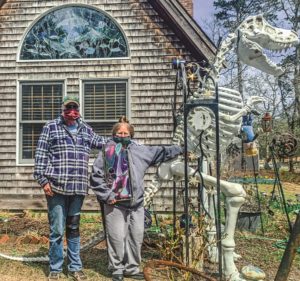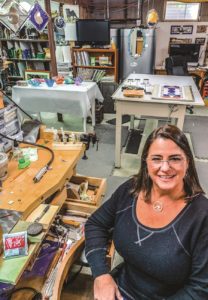Celebrating the 50th Earth Day last week required environmental organizations across the Outer Cape to get creative.
Both the Center for Coastal Studies in Provincetown and the Eastham Conservation Foundation organized cleanups, but this year without working in large groups.
Laura Ludwig, coordinator of the center’s Marine Debris and Plastics Program, organized an Earth Day cleanup in which households individually collected litter. In total, 70 people participated, with about one third of volunteers sending in data cards tallying the trash, she said.

Since it was organized online, locales were near and far. Volunteers collected trash not only on Cape Cod beaches, but also in western Massachusetts, Rhode Island, Maine, and West Virginia. Ludwig was glad to reach people who hadn’t worked with the center before.
Despite the cold weather, “The feedback was fantastic,” Ludwig said. “People were so grateful to feel they weren’t doing it by themselves — that there was a bigger collective behind it.”
At the Eastham Conservation Foundation’s second annual cleanup at Bee’s River Marsh, volunteers picked up 300 pounds of trash. Seven households — a total of 15 people — worked on sections of the marsh over the course of several days while maintaining social distancing.
Foundation director Bill Allan told the Independent that volunteers were glad to participate. “People were gratified by getting out and doing something productive, when there’s not many productive things you can do these days,” he said.
Allan said volunteers ended up with less rubbish than the 1.5 tons collected last year, but that’s a step forward, since after the big effort last year, there was less trash to be found.
But with fewer people, larger items, such as tires, were left behind. “We need to understand what’s coming in and get to the source,” Allan said. “There are 50 car tires along the edge of the marsh. How did they get there? They floated in from fishing boats, which use them for bumpers.”
Ludwig agreed and emphasized the importance of counting the trash and tallying the data. “That way, you can draw attention to who the culprits are,” she said. Recording what garbage ends up in the environment is the first step toward stopping it from entering it in the first place.
Construction materials, Ludwig said, make up much of the debris found at the ocean. “It’s probably the worst offender,” she said.
Ludwig thinks construction materials blow out of uncovered dumpsters. “It’s a hard thing to manage, and harder to enforce,” she said. “But by having data, you can work with town managers and builders.”
Allan pointed out that what ends up in Bee’s River Marsh is just a fraction of the trash dumped in the ocean. “A lot of what we find is just little pieces of plastic,” he said. “Where did the rest go? It breaks down into microplastics, which get incorporated into the plants and environment, and ultimately into us.”
Harriet Korim of Wellfleet, a member of the climate-action group Cape Cool, was disappointed that live climate strikes on Earth Day were canceled due to the coronavirus. The Wellfleet Conservation Trust’s celebration of the 50th Earth Day at Preservation Hall was also canceled. Groups like Sunrise Movement and Extinction Rebellion, which helped to organize the global strike, held online rallies instead.
In lieu of a strike, Korim helped launch another project to get Outer Cape residents curious about their surroundings: a census of trees. It will continue for one year and encourage adults and children to observe and identify trees. “The real motivation is to learn how crucial trees are, and how much we don’t understand,” Korim said.
On its website, Cape Cool asks students to pay attention to one bud on a tree by tying a piece of string around its base and drawing it every day. Participants can then send in their artwork, which will be posted online.





